A Critical Review of Globalization, Imperialism & Indigenous Research
VerifiedAdded on 2023/04/19
|7
|1300
|331
Essay
AI Summary
This essay presents a critical review of two articles: one discussing teacher education reform and the globalization of capitalism, and the other focusing on Indigenous Research Methodology (IRM) and its connection to Indigenous Epistemology. The first article, by McLaren and Farahmandpur (2001), examines the impact of neoliberalism on education and the exploitation of the working class. The second article, by Sockbeson (2017), explores the concept of epistemicide and the resilience of Waponahki epistemology, emphasizing the importance of incorporating Indigenous perspectives into education. The review analyzes the strengths and weaknesses of both articles, highlighting their contributions to understanding the complexities of globalization, imperialism, and indigenous knowledge systems.
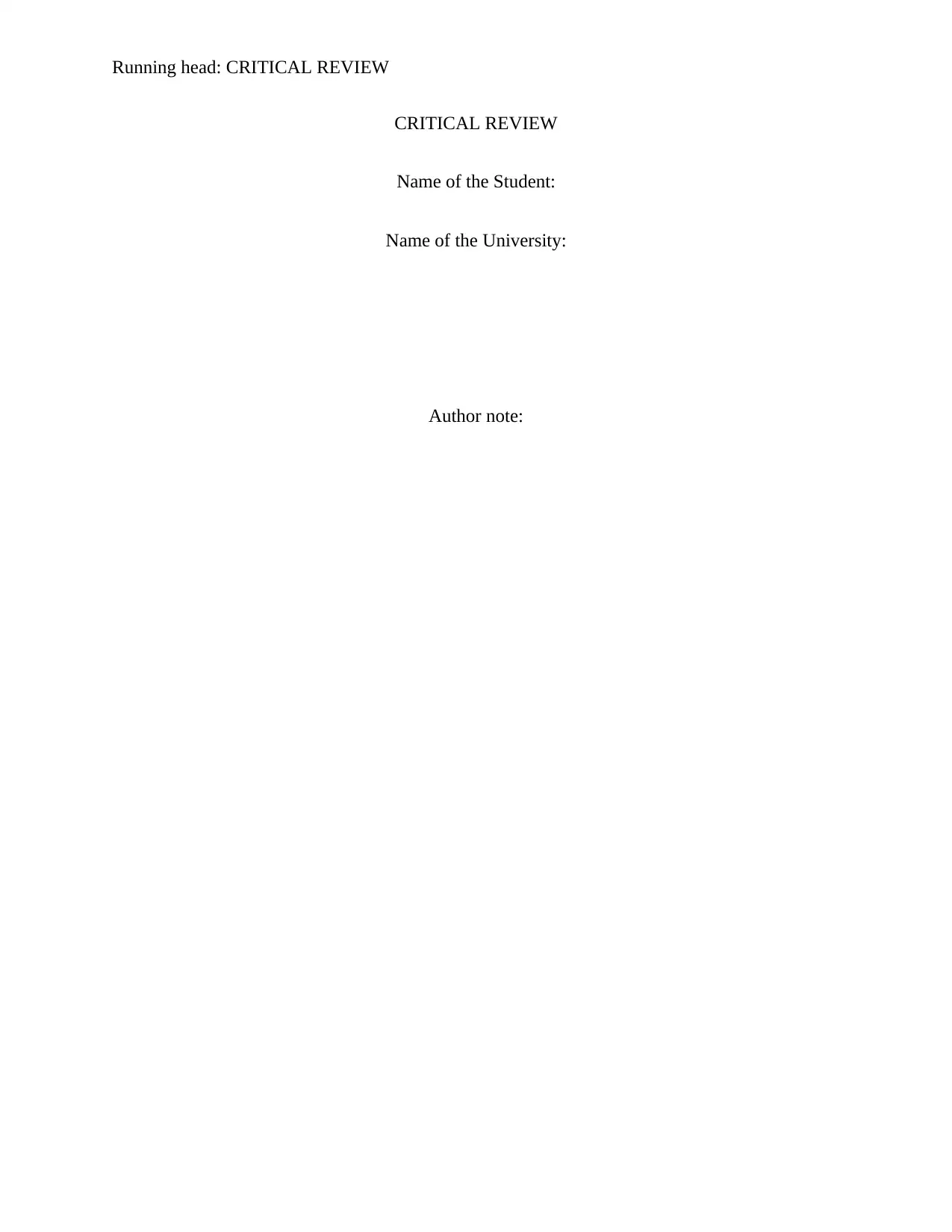
Running head: CRITICAL REVIEW
CRITICAL REVIEW
Name of the Student:
Name of the University:
Author note:
CRITICAL REVIEW
Name of the Student:
Name of the University:
Author note:
Paraphrase This Document
Need a fresh take? Get an instant paraphrase of this document with our AI Paraphraser
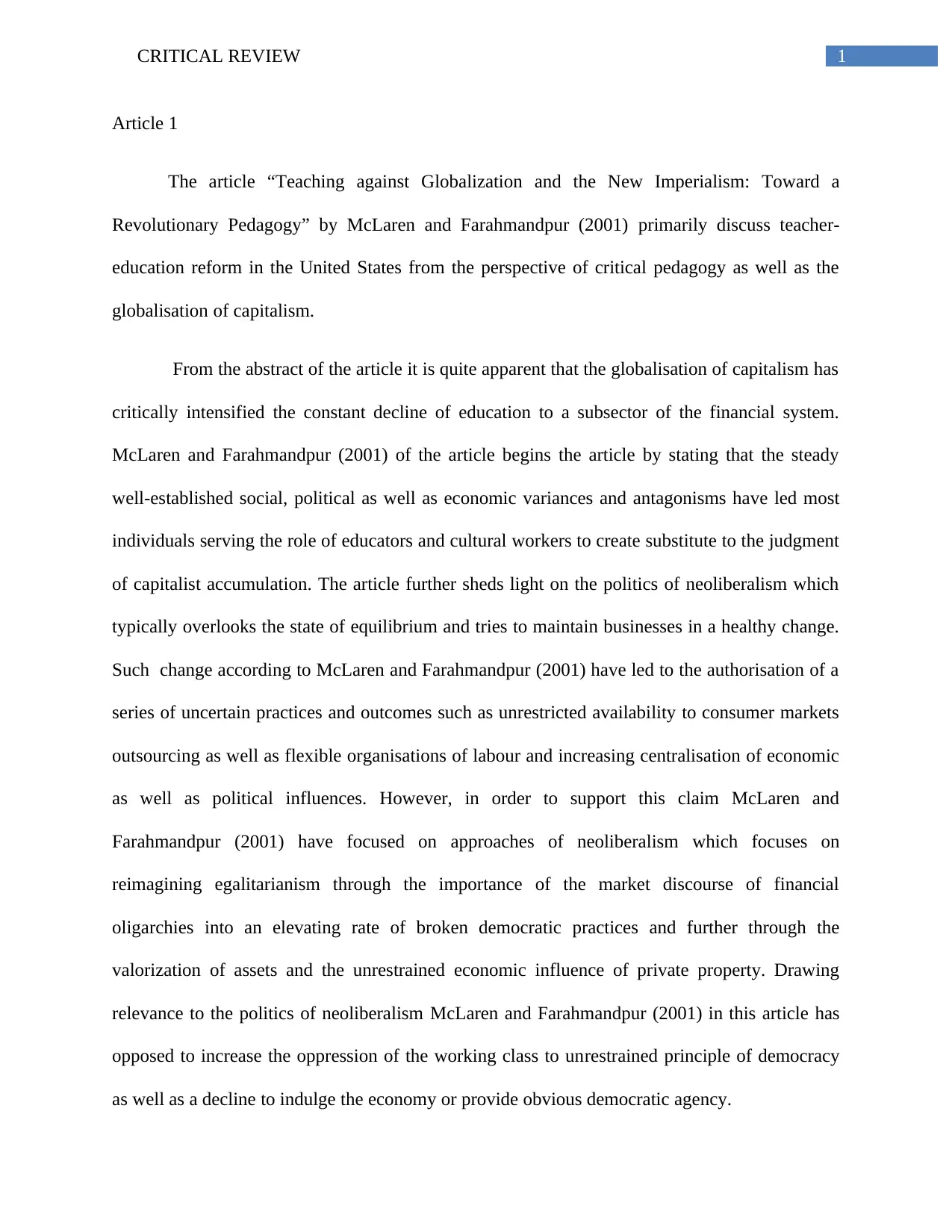
1CRITICAL REVIEW
Article 1
The article “Teaching against Globalization and the New Imperialism: Toward a
Revolutionary Pedagogy” by McLaren and Farahmandpur (2001) primarily discuss teacher-
education reform in the United States from the perspective of critical pedagogy as well as the
globalisation of capitalism.
From the abstract of the article it is quite apparent that the globalisation of capitalism has
critically intensified the constant decline of education to a subsector of the financial system.
McLaren and Farahmandpur (2001) of the article begins the article by stating that the steady
well-established social, political as well as economic variances and antagonisms have led most
individuals serving the role of educators and cultural workers to create substitute to the judgment
of capitalist accumulation. The article further sheds light on the politics of neoliberalism which
typically overlooks the state of equilibrium and tries to maintain businesses in a healthy change.
Such change according to McLaren and Farahmandpur (2001) have led to the authorisation of a
series of uncertain practices and outcomes such as unrestricted availability to consumer markets
outsourcing as well as flexible organisations of labour and increasing centralisation of economic
as well as political influences. However, in order to support this claim McLaren and
Farahmandpur (2001) have focused on approaches of neoliberalism which focuses on
reimagining egalitarianism through the importance of the market discourse of financial
oligarchies into an elevating rate of broken democratic practices and further through the
valorization of assets and the unrestrained economic influence of private property. Drawing
relevance to the politics of neoliberalism McLaren and Farahmandpur (2001) in this article has
opposed to increase the oppression of the working class to unrestrained principle of democracy
as well as a decline to indulge the economy or provide obvious democratic agency.
Article 1
The article “Teaching against Globalization and the New Imperialism: Toward a
Revolutionary Pedagogy” by McLaren and Farahmandpur (2001) primarily discuss teacher-
education reform in the United States from the perspective of critical pedagogy as well as the
globalisation of capitalism.
From the abstract of the article it is quite apparent that the globalisation of capitalism has
critically intensified the constant decline of education to a subsector of the financial system.
McLaren and Farahmandpur (2001) of the article begins the article by stating that the steady
well-established social, political as well as economic variances and antagonisms have led most
individuals serving the role of educators and cultural workers to create substitute to the judgment
of capitalist accumulation. The article further sheds light on the politics of neoliberalism which
typically overlooks the state of equilibrium and tries to maintain businesses in a healthy change.
Such change according to McLaren and Farahmandpur (2001) have led to the authorisation of a
series of uncertain practices and outcomes such as unrestricted availability to consumer markets
outsourcing as well as flexible organisations of labour and increasing centralisation of economic
as well as political influences. However, in order to support this claim McLaren and
Farahmandpur (2001) have focused on approaches of neoliberalism which focuses on
reimagining egalitarianism through the importance of the market discourse of financial
oligarchies into an elevating rate of broken democratic practices and further through the
valorization of assets and the unrestrained economic influence of private property. Drawing
relevance to the politics of neoliberalism McLaren and Farahmandpur (2001) in this article has
opposed to increase the oppression of the working class to unrestrained principle of democracy
as well as a decline to indulge the economy or provide obvious democratic agency.
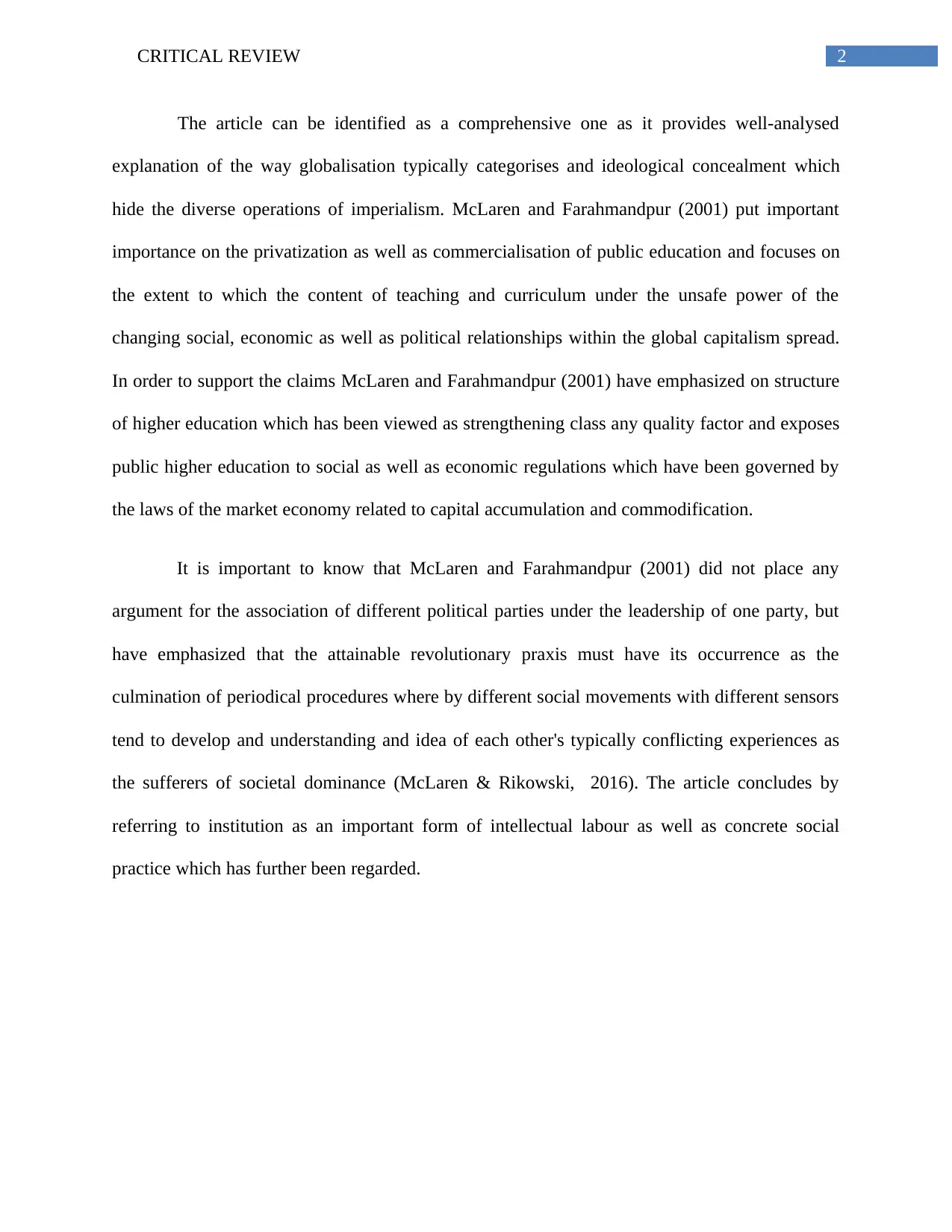
2CRITICAL REVIEW
The article can be identified as a comprehensive one as it provides well-analysed
explanation of the way globalisation typically categorises and ideological concealment which
hide the diverse operations of imperialism. McLaren and Farahmandpur (2001) put important
importance on the privatization as well as commercialisation of public education and focuses on
the extent to which the content of teaching and curriculum under the unsafe power of the
changing social, economic as well as political relationships within the global capitalism spread.
In order to support the claims McLaren and Farahmandpur (2001) have emphasized on structure
of higher education which has been viewed as strengthening class any quality factor and exposes
public higher education to social as well as economic regulations which have been governed by
the laws of the market economy related to capital accumulation and commodification.
It is important to know that McLaren and Farahmandpur (2001) did not place any
argument for the association of different political parties under the leadership of one party, but
have emphasized that the attainable revolutionary praxis must have its occurrence as the
culmination of periodical procedures where by different social movements with different sensors
tend to develop and understanding and idea of each other's typically conflicting experiences as
the sufferers of societal dominance (McLaren & Rikowski, 2016). The article concludes by
referring to institution as an important form of intellectual labour as well as concrete social
practice which has further been regarded.
The article can be identified as a comprehensive one as it provides well-analysed
explanation of the way globalisation typically categorises and ideological concealment which
hide the diverse operations of imperialism. McLaren and Farahmandpur (2001) put important
importance on the privatization as well as commercialisation of public education and focuses on
the extent to which the content of teaching and curriculum under the unsafe power of the
changing social, economic as well as political relationships within the global capitalism spread.
In order to support the claims McLaren and Farahmandpur (2001) have emphasized on structure
of higher education which has been viewed as strengthening class any quality factor and exposes
public higher education to social as well as economic regulations which have been governed by
the laws of the market economy related to capital accumulation and commodification.
It is important to know that McLaren and Farahmandpur (2001) did not place any
argument for the association of different political parties under the leadership of one party, but
have emphasized that the attainable revolutionary praxis must have its occurrence as the
culmination of periodical procedures where by different social movements with different sensors
tend to develop and understanding and idea of each other's typically conflicting experiences as
the sufferers of societal dominance (McLaren & Rikowski, 2016). The article concludes by
referring to institution as an important form of intellectual labour as well as concrete social
practice which has further been regarded.
⊘ This is a preview!⊘
Do you want full access?
Subscribe today to unlock all pages.

Trusted by 1+ million students worldwide
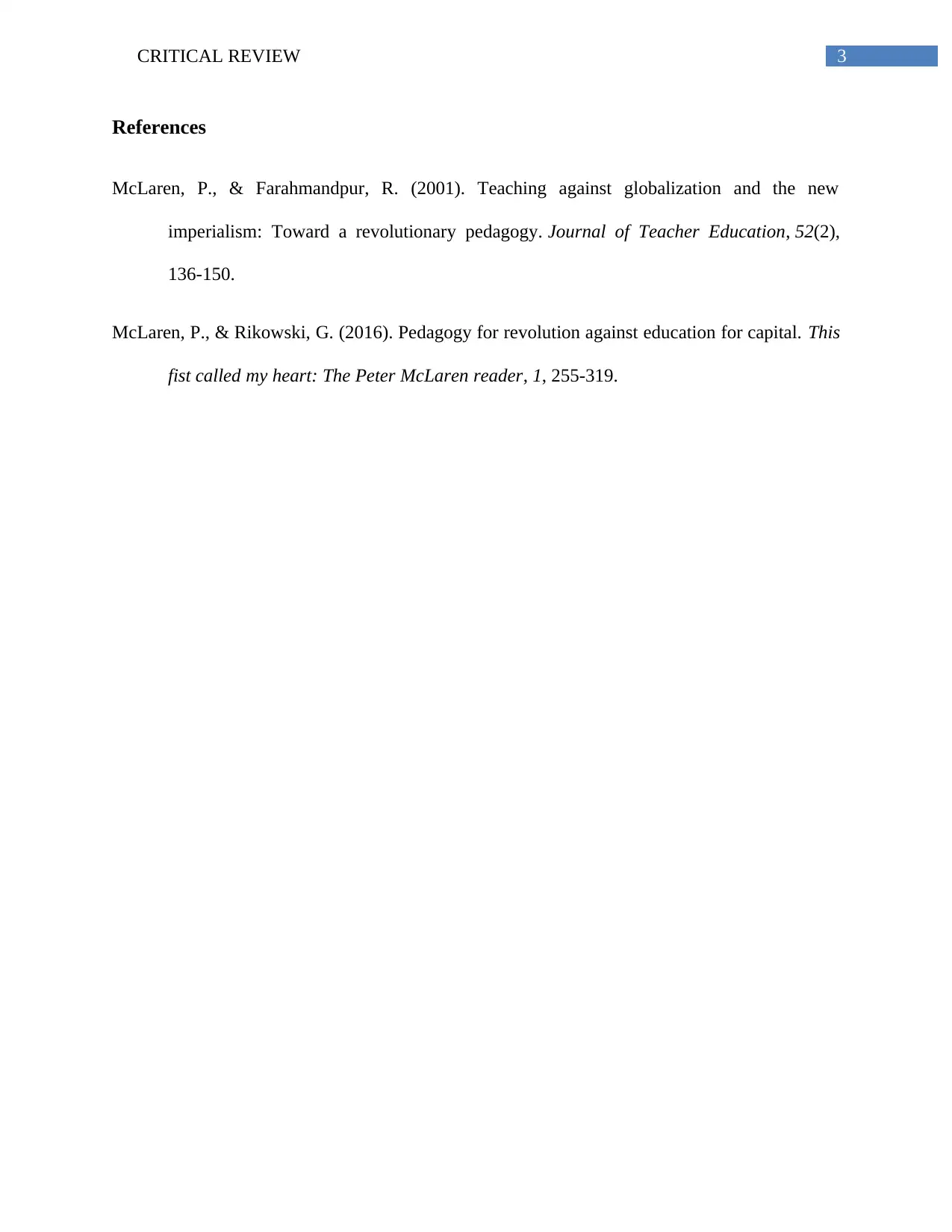
3CRITICAL REVIEW
References
McLaren, P., & Farahmandpur, R. (2001). Teaching against globalization and the new
imperialism: Toward a revolutionary pedagogy. Journal of Teacher Education, 52(2),
136-150.
McLaren, P., & Rikowski, G. (2016). Pedagogy for revolution against education for capital. This
fist called my heart: The Peter McLaren reader, 1, 255-319.
References
McLaren, P., & Farahmandpur, R. (2001). Teaching against globalization and the new
imperialism: Toward a revolutionary pedagogy. Journal of Teacher Education, 52(2),
136-150.
McLaren, P., & Rikowski, G. (2016). Pedagogy for revolution against education for capital. This
fist called my heart: The Peter McLaren reader, 1, 255-319.
Paraphrase This Document
Need a fresh take? Get an instant paraphrase of this document with our AI Paraphraser
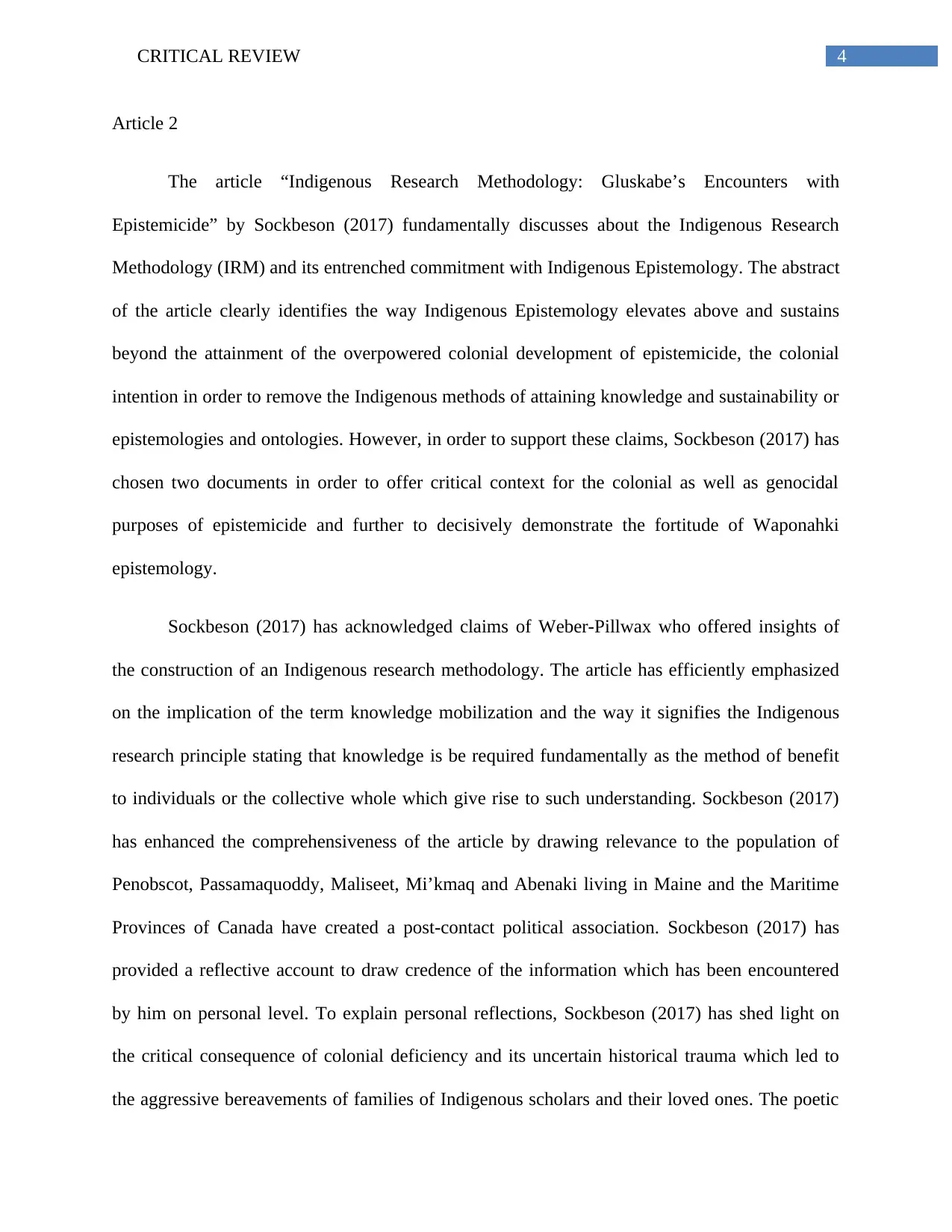
4CRITICAL REVIEW
Article 2
The article “Indigenous Research Methodology: Gluskabe’s Encounters with
Epistemicide” by Sockbeson (2017) fundamentally discusses about the Indigenous Research
Methodology (IRM) and its entrenched commitment with Indigenous Epistemology. The abstract
of the article clearly identifies the way Indigenous Epistemology elevates above and sustains
beyond the attainment of the overpowered colonial development of epistemicide, the colonial
intention in order to remove the Indigenous methods of attaining knowledge and sustainability or
epistemologies and ontologies. However, in order to support these claims, Sockbeson (2017) has
chosen two documents in order to offer critical context for the colonial as well as genocidal
purposes of epistemicide and further to decisively demonstrate the fortitude of Waponahki
epistemology.
Sockbeson (2017) has acknowledged claims of Weber-Pillwax who offered insights of
the construction of an Indigenous research methodology. The article has efficiently emphasized
on the implication of the term knowledge mobilization and the way it signifies the Indigenous
research principle stating that knowledge is be required fundamentally as the method of benefit
to individuals or the collective whole which give rise to such understanding. Sockbeson (2017)
has enhanced the comprehensiveness of the article by drawing relevance to the population of
Penobscot, Passamaquoddy, Maliseet, Mi’kmaq and Abenaki living in Maine and the Maritime
Provinces of Canada have created a post-contact political association. Sockbeson (2017) has
provided a reflective account to draw credence of the information which has been encountered
by him on personal level. To explain personal reflections, Sockbeson (2017) has shed light on
the critical consequence of colonial deficiency and its uncertain historical trauma which led to
the aggressive bereavements of families of Indigenous scholars and their loved ones. The poetic
Article 2
The article “Indigenous Research Methodology: Gluskabe’s Encounters with
Epistemicide” by Sockbeson (2017) fundamentally discusses about the Indigenous Research
Methodology (IRM) and its entrenched commitment with Indigenous Epistemology. The abstract
of the article clearly identifies the way Indigenous Epistemology elevates above and sustains
beyond the attainment of the overpowered colonial development of epistemicide, the colonial
intention in order to remove the Indigenous methods of attaining knowledge and sustainability or
epistemologies and ontologies. However, in order to support these claims, Sockbeson (2017) has
chosen two documents in order to offer critical context for the colonial as well as genocidal
purposes of epistemicide and further to decisively demonstrate the fortitude of Waponahki
epistemology.
Sockbeson (2017) has acknowledged claims of Weber-Pillwax who offered insights of
the construction of an Indigenous research methodology. The article has efficiently emphasized
on the implication of the term knowledge mobilization and the way it signifies the Indigenous
research principle stating that knowledge is be required fundamentally as the method of benefit
to individuals or the collective whole which give rise to such understanding. Sockbeson (2017)
has enhanced the comprehensiveness of the article by drawing relevance to the population of
Penobscot, Passamaquoddy, Maliseet, Mi’kmaq and Abenaki living in Maine and the Maritime
Provinces of Canada have created a post-contact political association. Sockbeson (2017) has
provided a reflective account to draw credence of the information which has been encountered
by him on personal level. To explain personal reflections, Sockbeson (2017) has shed light on
the critical consequence of colonial deficiency and its uncertain historical trauma which led to
the aggressive bereavements of families of Indigenous scholars and their loved ones. The poetic
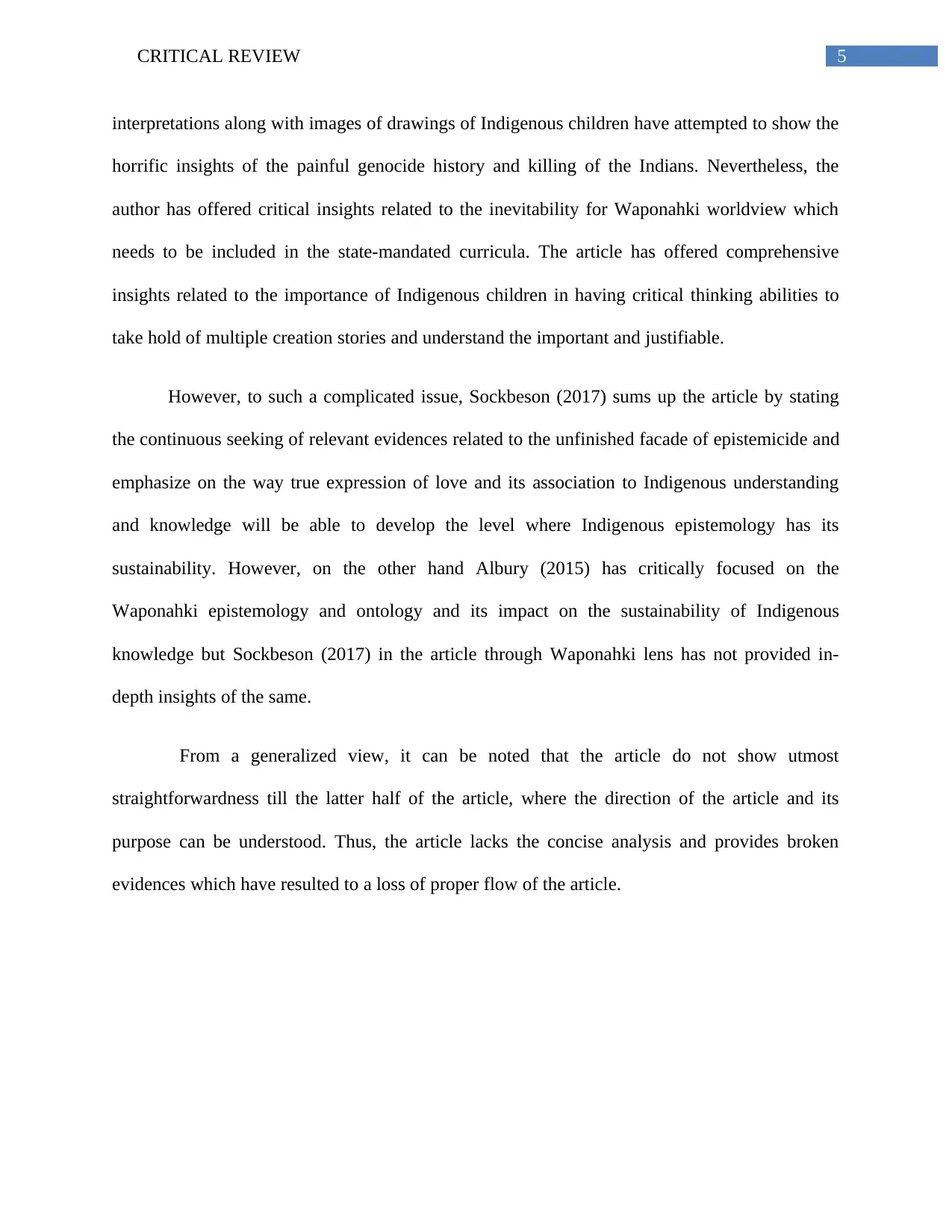
5CRITICAL REVIEW
interpretations along with images of drawings of Indigenous children have attempted to show the
horrific insights of the painful genocide history and killing of the Indians. Nevertheless, the
author has offered critical insights related to the inevitability for Waponahki worldview which
needs to be included in the state-mandated curricula. The article has offered comprehensive
insights related to the importance of Indigenous children in having critical thinking abilities to
take hold of multiple creation stories and understand the important and justifiable.
However, to such a complicated issue, Sockbeson (2017) sums up the article by stating
the continuous seeking of relevant evidences related to the unfinished facade of epistemicide and
emphasize on the way true expression of love and its association to Indigenous understanding
and knowledge will be able to develop the level where Indigenous epistemology has its
sustainability. However, on the other hand Albury (2015) has critically focused on the
Waponahki epistemology and ontology and its impact on the sustainability of Indigenous
knowledge but Sockbeson (2017) in the article through Waponahki lens has not provided in-
depth insights of the same.
From a generalized view, it can be noted that the article do not show utmost
straightforwardness till the latter half of the article, where the direction of the article and its
purpose can be understood. Thus, the article lacks the concise analysis and provides broken
evidences which have resulted to a loss of proper flow of the article.
interpretations along with images of drawings of Indigenous children have attempted to show the
horrific insights of the painful genocide history and killing of the Indians. Nevertheless, the
author has offered critical insights related to the inevitability for Waponahki worldview which
needs to be included in the state-mandated curricula. The article has offered comprehensive
insights related to the importance of Indigenous children in having critical thinking abilities to
take hold of multiple creation stories and understand the important and justifiable.
However, to such a complicated issue, Sockbeson (2017) sums up the article by stating
the continuous seeking of relevant evidences related to the unfinished facade of epistemicide and
emphasize on the way true expression of love and its association to Indigenous understanding
and knowledge will be able to develop the level where Indigenous epistemology has its
sustainability. However, on the other hand Albury (2015) has critically focused on the
Waponahki epistemology and ontology and its impact on the sustainability of Indigenous
knowledge but Sockbeson (2017) in the article through Waponahki lens has not provided in-
depth insights of the same.
From a generalized view, it can be noted that the article do not show utmost
straightforwardness till the latter half of the article, where the direction of the article and its
purpose can be understood. Thus, the article lacks the concise analysis and provides broken
evidences which have resulted to a loss of proper flow of the article.
⊘ This is a preview!⊘
Do you want full access?
Subscribe today to unlock all pages.

Trusted by 1+ million students worldwide
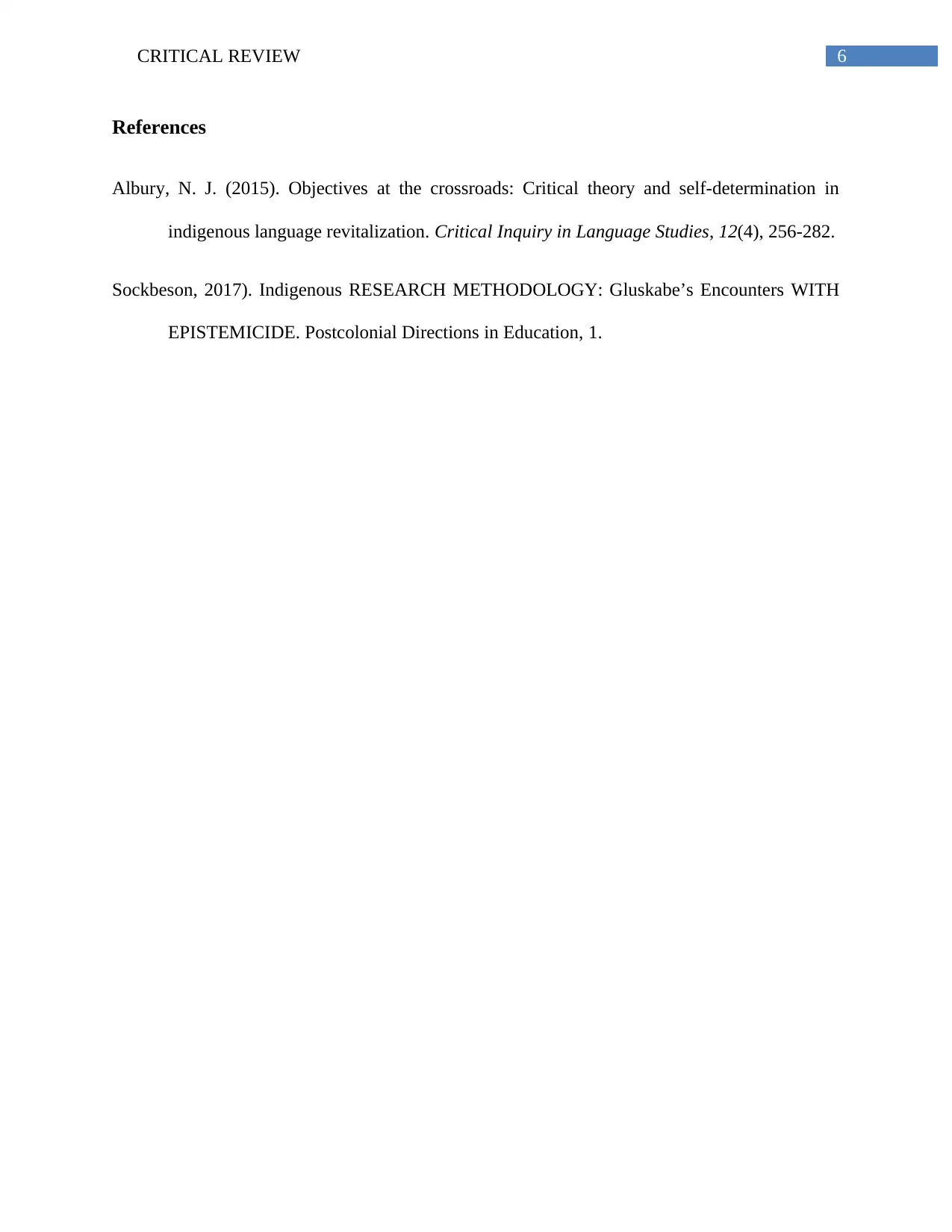
6CRITICAL REVIEW
References
Albury, N. J. (2015). Objectives at the crossroads: Critical theory and self-determination in
indigenous language revitalization. Critical Inquiry in Language Studies, 12(4), 256-282.
Sockbeson, 2017). Indigenous RESEARCH METHODOLOGY: Gluskabe’s Encounters WITH
EPISTEMICIDE. Postcolonial Directions in Education, 1.
References
Albury, N. J. (2015). Objectives at the crossroads: Critical theory and self-determination in
indigenous language revitalization. Critical Inquiry in Language Studies, 12(4), 256-282.
Sockbeson, 2017). Indigenous RESEARCH METHODOLOGY: Gluskabe’s Encounters WITH
EPISTEMICIDE. Postcolonial Directions in Education, 1.
1 out of 7
Your All-in-One AI-Powered Toolkit for Academic Success.
+13062052269
info@desklib.com
Available 24*7 on WhatsApp / Email
![[object Object]](/_next/static/media/star-bottom.7253800d.svg)
Unlock your academic potential
Copyright © 2020–2026 A2Z Services. All Rights Reserved. Developed and managed by ZUCOL.

